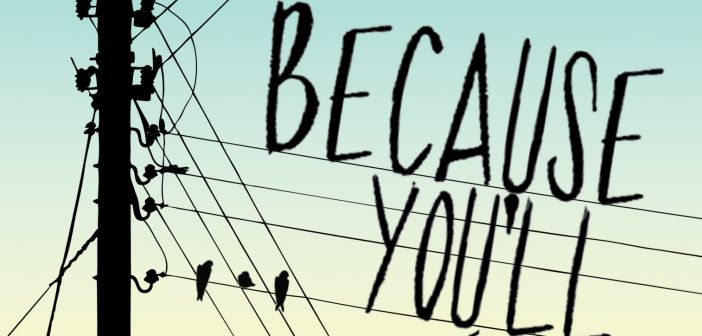I found the premise of Because You’ll Never Meet Me a very interesting one. Two boys who have never met each other exchange letters and form a friendship. Not only have they never met, they’ll never be able to. Ollie has seizures that are triggered by electricity and Moritz is blind, but also has a pacemaker. A meeting between the two of them might kill Ollie as his seizures are extremely severe; he has almost died several times already.
 In this review, I will specifically be examining the portrayal of Moritz. Like him, I’ve been blind since birth and live in Europe. Unfortunately, I was quite disappointed with his portrayal.
In this review, I will specifically be examining the portrayal of Moritz. Like him, I’ve been blind since birth and live in Europe. Unfortunately, I was quite disappointed with his portrayal.
Moritz uses echolocation to navigate his surroundings to the exclusion of all other methods. When humans use echolocation, they can sense where objects are by making a sound—typically a clicking sound with the tongue—and listening to the echo as the sound bounces off objects. Echolocation isn’t unheard of; in fact, there are a reasonable number of blind people who use it to complement cane and dog travel. But even the biggest advocates of echolocation say you should not use it on its own. In this documentary, Daniel Kish (who leads the organisation World Access for the Blind) explains why it can be dangerous to rely on echolocation alone in this YouTube video. The segment starts around 31 minutes in.
By echolocating, Moritz can hear specks of dust and how many eyelashes people have. By only the second chapter of this book, the story was already falling into the heightened senses trope. I’ve read a lot of books where blind people have superhuman hearing, but unfortunately, we don’t. It would be pretty great if we do, but we are actually incredibly ordinary. Instead of having heightened senses, we simply tend to use the ones we have more efficiently. Whilst other people are using their vision, I will be listening to the environment around me.
I also felt like the author used Moritz’s ability to echolocate as a way of avoiding showing a realistic portrayal of blindness. For example, Moritz would describe people’s facial expressions, something he couldn’t know as a blind person no matter how good his echolocation is. Moritz read as sighted for all intents and purposes, so I questioned the reason for writing him as blind at all. Here’s an example of how extreme his portrayal was:
Owen’s eyes widened. He signed a symbol similar to “hospital” to my untrained ears.
There is no way someone who is blind could know these things. I felt like I, as a reader, was being cheated. There are so few blind characters in fiction and this book had a lot of potential, but unfortunately it never lived up to that potential.
I do want to emphasise that it’s rare to find young adult fiction focused on friendship, and even rarer on friendship between two boys. I hope that we see more of that in the future because it’s something important that many of us forget about. For that reason, I wanted to love Because You’ll Never Meet Me. I wanted to champion it like others have done, but there was no way I could. Throughout the book, too many tired blindness tropes popped up, and it became quite an uncomfortable experience for me to finish it.


3 Comments
Hi Holly. I’ve enjoyed the reviews this week. Thanks for sharing.
I loved this book, but i think perhaps in part because I largely read Moritz’s ability as fantasy. I felt like the lab experiment stuff and the way they resolve Ollie’s situation (trying not to spoil) 🙂 made it clear to me that this wasn’t meant to be taken as true to life and more like sci-fi.
I hadn’t considered how frustrating or disappointing it would be to try to read it as entirely plausible, because even to a person with sight, it’s clearly over the top. I’m sorry you had such a bad experience with the book. I agree with what you said about books about boys as friends. That was a definite triumph for this novel, I thought. Thanks for sharing your review.
Pingback: The Disability in Kidlit guide to ALA Midwinter 2016
Pingback: Diverse Books Out February 2017 | Xpresso Reads